Six unforgettable UN General Assembly moments
Al Jazeera looks back at key UN General Assembly speeches as world leaders and top diplomats gather for 78th session this week.
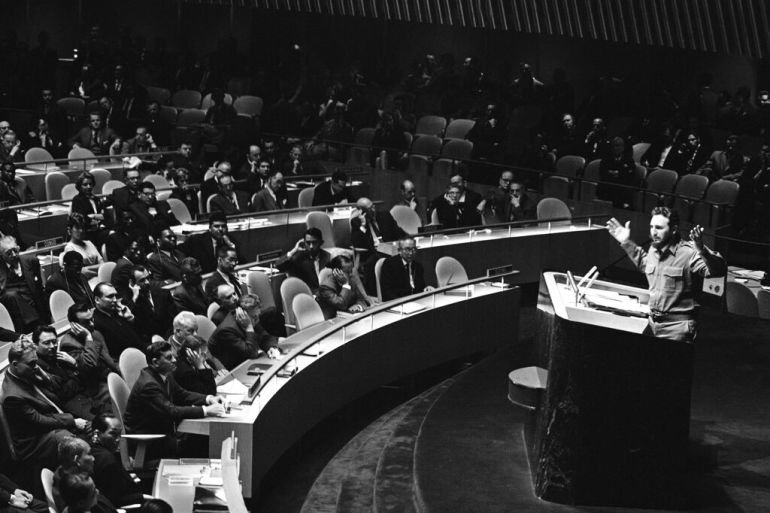
Washington, DC – Since its first session in 1946, the United Nations General Assembly (UNGA) has served as a platform for world leaders and diplomats to spell out their countries’ priorities and offer assessments of the problems and needs of humanity.
UNGA meetings, particularly the general debate, have brought sworn enemies to the same building and allowed some of the United States’ most hostile adversaries to visit New York, where the UN headquarters are located.
Keep reading
list of 3 itemsUN rights panel warns Nicaragua is being ‘stripped’ of critical voices
UN envoy to Sudan steps down after being declared unwelcome by government
As the assembly convenes for its annual session this week, here’s a look at some unforgettable, and sometimes comical, UNGA moments.
Gaddafi rages against superpowers for 100 minutes
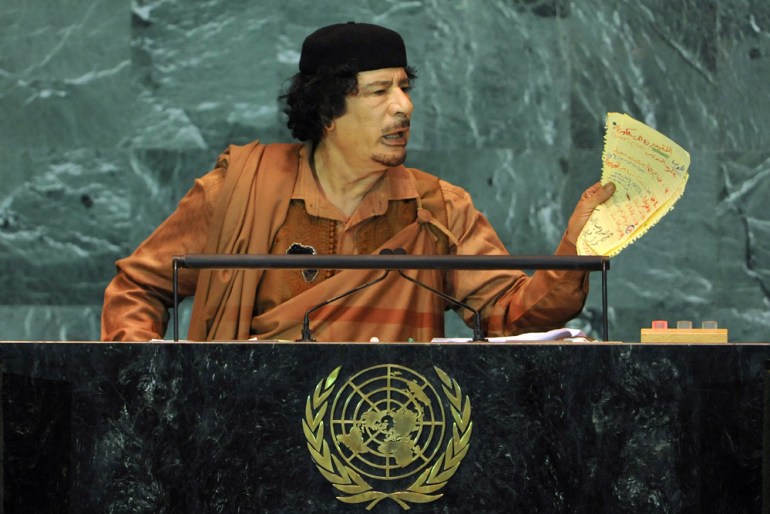
After more than four decades in power, the late Libyan leader Muammar Gaddafi made it to the UN podium in 2009. And it was a debut to remember.
Gaddafi delivered a scathing speech against world powers that lasted nearly 100 minutes.
The eccentric authoritarian leader — who would be overthrown and subsequently killed in a NATO-backed uprising two years later — decried the veto powers of the five permanent members of the UN Security Council.
“Veto power should be annulled,” Gaddafi said. “The Security Council did not provide us with security but with terror and sanctions.”
He read aloud sections of the UN Charter to highlight what he said were the shortcomings of the international body and its failure to apply the rules.
Gaddafi also called for an investigation into the 2003 US-led invasion of Iraq, questioning why the UN Charter’s provisions against aggression were held in sacred status when Iraq invaded Kuwait in 1990 but “thrown in the bin” when the country itself was invaded.
“The invasion of Iraq — without justification, in violation of the Charter — occurs by superpowers on the Security Council,” he said.
“And Iraq is an independent nation and a member of the General Assembly. How is it that it was attacked and how is it that the Charter was not applied?”
Regardless of the speech’s content, it will be most remembered for its length. UNGA speakers are allocated 15-minute slots — a limit Gaddafi blew past with fiery abandon.
Hugo Chavez calls George W Bush ‘the devil’
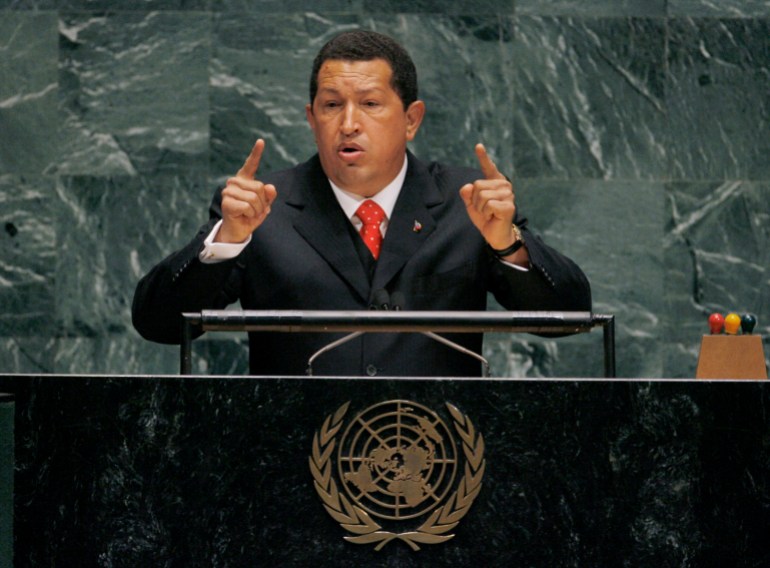
Amid a growing confrontation between Caracas and Washington in 2006, Venezuela’s President Hugo Chavez called then-US President Geoge W Bush “the devil” from the UN stage.
“Yesterday, the devil came here — right here. And it smells of sulphur still today,” Chavez told the UNGA.
He went on to deliver a blistering attack on Bush’s policies, citing a US-backed Israeli military operation in Lebanon that killed more than 1,000 people and destroyed large parts of the country’s civilian infrastructure weeks earlier.
“The government of the United States doesn’t want peace. It wants to exploit its system of exploitation, of pillage, of hegemony through war,” Chavez said.
“It wants peace. But what’s happening in Iraq? What happened in Lebanon? In Palestine? What’s happening? What’s happened over the last 100 years in Latin America and in the world? And now threatening Venezuela — new threats against Venezuela, against Iran?”
Years later, Chavez — who died in 2013 — said that his “devil” comment was not scripted and that he did smell sulphur that day.
Trump threatens to ‘totally destroy’ North Korea
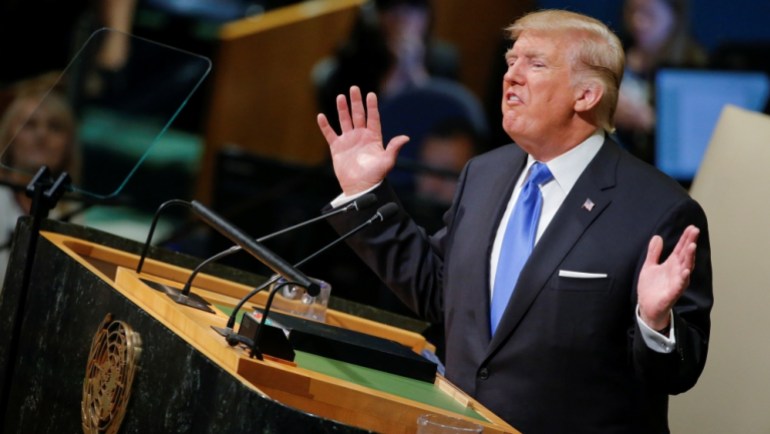
While UNGA speeches often focus on international cooperation and shared challenges, former US President Donald Trump delivered a fiery attack on North Korea in his first appearance at the international body in 2017.
“The United States has great strength and patience, but if it is forced to defend itself or its allies, we will have no choice but to totally destroy North Korea. Rocket Man is on a suicide mission for himself and for his regime,” he said, referring to North Korean leader Kim Jong Un.
“The United States is ready, willing and able, but hopefully this will not be necessary.”
Less than a year later, Trump would become the first US president to meet with Kim at a summit in Singapore.
Trump then softened his tone towards the North Korean leader, but a subsequent meeting in Hanoi in 2018 failed to produce a deal to resolve the standoff between Washington and Pyongyang.
North Korea has continued its ballistic missile testing and pushed on with its nuclear programme as the US strengthens security ties with Japan and South Korea.
More recently, the US has been voicing concerns about the deepening alliance between North Korea and Russia.
Netanyahu draws a red line on Iran’s nuclear programme
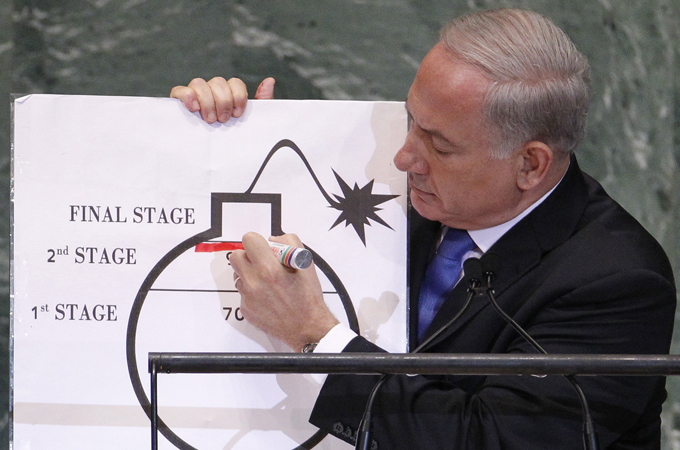
Eight years ago, Israeli Prime Minister Benjamin Netanyahu warned that Iran was months away from acquiring a nuclear weapon.
“How much enriched uranium do you need for a bomb? And how close is Iran to getting it?” Netanyahu asked. He then proceeded to answer his own question. “Well, let me show you. I brought a diagram for you.”
Despite the complexities of nuclear science, Netanyahu’s diagram consisted of a cartoon depicting a round bomb with a fuse.
He claimed that Tehran had already amassed 70 percent of the enriched uranium needed to build a nuclear weapon and was well on the way to the second stage, marked as 90 percent.
“If these are the facts, and they are, where should a red line be drawn? A red line should be drawn right here,” Netanyahu said, drawing an actual red line at the 90-percent mark.
The Israeli prime minister would emerge as one of the most outspoken critics of the 2015 Iran nuclear deal that saw Tehran scale back its nuclear programme in exchange for the US and its allies lifting sanctions against its economy.
Trump nixed the agreement in 2018, and Iran has been escalating its programme since, but Tehran denies seeking a nuclear weapon.
Boris Johnson warns of AI dangers
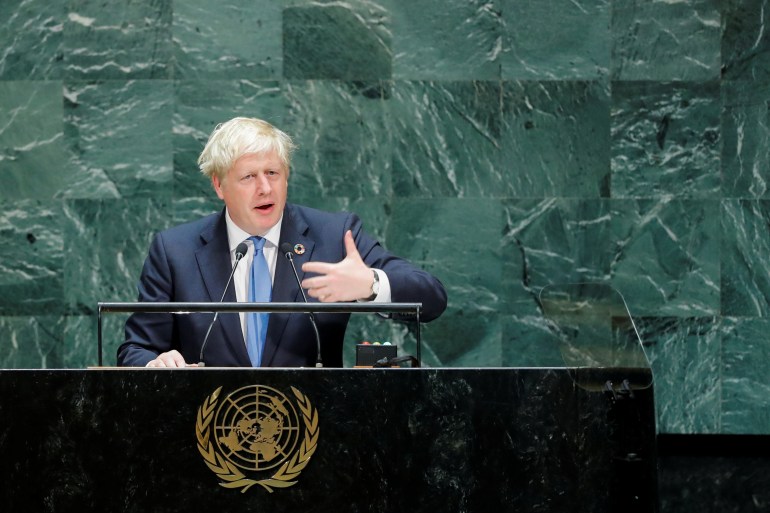
Facing a political crisis at home — as he had through most of his tenure as the United Kingdom’s prime minister — Boris Johnson warned against the potential danger of artificial intelligence (AI) in a 2019 UNGA speech.
Johnson painted some bizarre images of a possible dystopian future where technological advances go awry, resulting in “terrifying limbless chickens”, among other things.
“A future Alexa will pretend to take orders. But this Alexa will be watching you, clucking her tongue and stamping her foot,” he said, referring to Amazon’s virtual assistant Alexa.
The then-prime minister questioned whether AI will produce robots to help ageing people or lead to “terminators” looking to cull the human race.
“What will synthetic biology stand for? Restoring our livers and our eyes with miracle regeneration of the tissues, like some fantastic hangover cure, or will it bring terrifying limbless chickens to our tables?” Johnson asked.
While the speech drew some ridicule at that time, recent breakthroughs in AI are now raising questions about the ethics and utility of the tool and spurring lawmakers across the world to consider regulations.
Fidel Castro speaks for four and a half hours
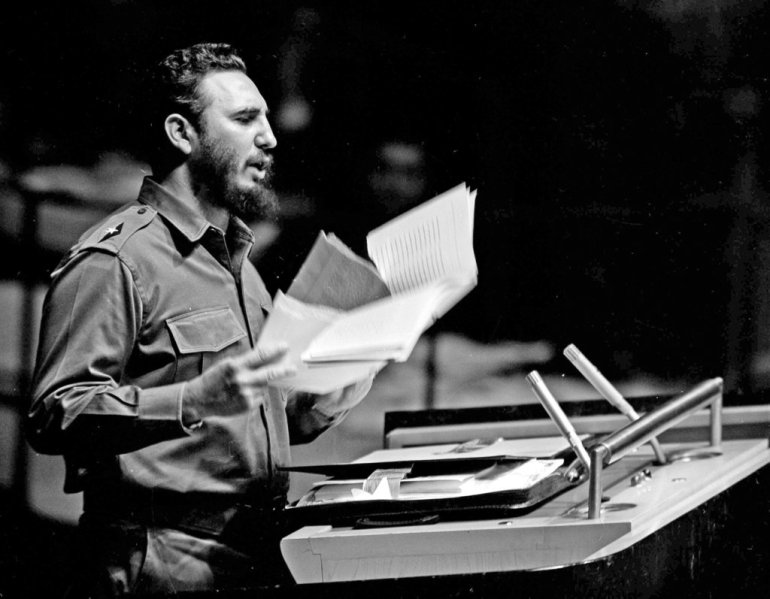
Gaddafi’s speech — as long as it was — did not come close to breaking the record for the longest speech at the UNGA.
Cuban leader Fidel Castro spoke for four and a half hours at a UNGA session in 1960. One year after the Cuban Revolution brought him to power, Castro — who would become public enemy number one in the US — delivered a lengthy critique of global inequality.
“The National General Assembly of the Cuban people condemns large-scale landowning as a source of poverty for the peasant and a backward and inhuman system of agricultural production,” Castro said, according to a transcript of the speech published by the University of Texas at Austin.
“It condemns starvation wages and the iniquitous exploitation of human work by illegitimate and privileged interests,” Castro continued. “It condemns illiteracy, the lack of teachers, of schools, doctors and hospitals, the lack of old-age security in the countries of America.”
He also denounced the “exploitation of women” as well as “military oligarchies, which keep our peoples in poverty, prevent their democratic development and the full exercise of their sovereignty”.
He went on for 269 minutes, according to UN records. One year after that speech, the US tried but failed to overthrow Castro in the Bay of Pigs invasion.